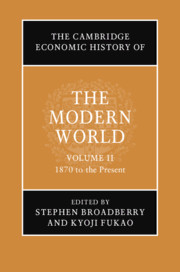Book contents
- The Cambridge Economic History of the Modern World
- The Cambridge Economic Historyof the Modern World
- The Cambridge Economic History of the Modern World
- Copyright page
- Contents
- Figures
- Tables
- Contributors to Volume II
- Introduction to Volume II
- Part I Regional Developments
- 1 North America
- 2 Western Europe
- 3 The Socialist Experiment and Beyond
- 4 Japan
- 5 Economic Changes in China
- 6 From Free Trade to Regulation
- 7 Growth and Globalization Phases in South East Asian Development
- 8 The Middle East
- 9 Latin America
- 10 African Economic Development
- 11 Australia
- Part II Factors Governing Differential Outcomes in the Global Economy
- Index
- References
5 - Economic Changes in China
The Role of Institutions and Ideology
from Part I - Regional Developments
Published online by Cambridge University Press: 03 June 2021
- The Cambridge Economic History of the Modern World
- The Cambridge Economic Historyof the Modern World
- The Cambridge Economic History of the Modern World
- Copyright page
- Contents
- Figures
- Tables
- Contributors to Volume II
- Introduction to Volume II
- Part I Regional Developments
- 1 North America
- 2 Western Europe
- 3 The Socialist Experiment and Beyond
- 4 Japan
- 5 Economic Changes in China
- 6 From Free Trade to Regulation
- 7 Growth and Globalization Phases in South East Asian Development
- 8 The Middle East
- 9 Latin America
- 10 African Economic Development
- 11 Australia
- Part II Factors Governing Differential Outcomes in the Global Economy
- Index
- References
Summary
This chapter provides an overview of the Chinese economy during 1850–2000 with both a quantitative profile and a period-by-period narrative on major eras of the late Qing, Republican and communist periods (including both the Mao era and the post-1978 reform period). More specifically, the chapter raises the question not only of why China fell behind, but more importantly why it took so long for China to industrialize after the Industrial Revolution had been well under way elsewhere. To this end, I highlight the importance of institutions and ideology, and their interaction in a feedback loop, as critical elements accounting for the remarkable transformations as well as much inertia during this 150 years of the Chinese response to Western or modernization challenges.
- Type
- Chapter
- Information
- The Cambridge Economic History of the Modern World , pp. 129 - 150Publisher: Cambridge University PressPrint publication year: 2021

